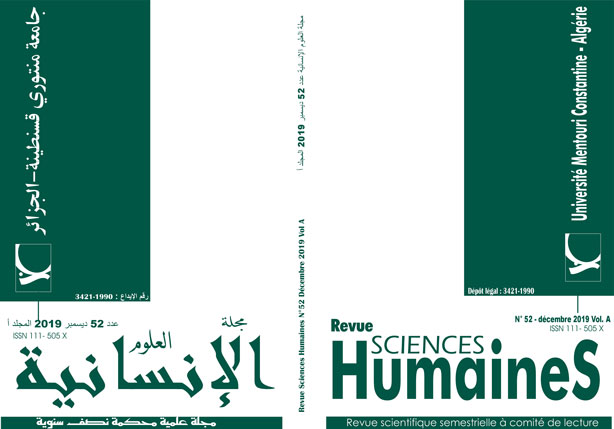Rhetoric Demystified
Mots-clés :
definition of rhetoric, rhetorical analysis, rhetorical criticismRésumé
Since its inception by the Greek scholars up until the contemporary times,the termrhetorichas undertaken a plethora of meanings. Those meanings have mainly been associated with what caused its flourishment in the Greek and Roman periods, decay in the middle and early modern ages, and revival in the twentieth century via various rhetorical theories. No doubt, the novice researchers in the field would get confused by the wide array of denotations this term carries. Therefore, the current article deals the definitional and historical debate vis-à-vis the extension of the term rhetoric. It, besides, provides an explanation of the two phrases: rhetorical analysis and rhetorical criticism.
Téléchargements
Références
Aristotle. (1991). On Rhetoric (G. Kennedy, trans.). Oxford: Oxford University Press. (Original work published 320 BC).
Beale, W. H. (1987). A Pragmatic Theory of Rhetoric. Carbondale, IL: Southern Illinois University Press.
Bitzer, L. (1968). The Rhetorical Situation.Philosophy and Rhetoric, 1, 1-14.
Bizzell, P., & Herzberg, B. (Eds.). (1990). The Rhetorical Tradition: Readings from Classical Times to the Present. Boston: Bedford.
Blair, H. (1965). Lectures on Rhetoric and Belles Lettres. Illinois: Southern Illinois University Press. (Original work published 1783).
Bogost, I. (2007). Persuasive Games. Cambridge, MA: MIT Press.
Booth, W. C. (1978). Metaphor as Rhetoric: The Problem of Evaluation. Critical Inquiry, 5(1), 49-72.
Bryant, D. C. (1973). Rhetorical Dimensions in Criticism. Baton Rouge: Louisiana State University Press.
Cathcart, R. S. (1991). Post-Communication: Rhetorical Analysis and Evaluation. Indianapolis: Bobbs-Merrill.
Collins English dictionary. (2003). Glasgow: HarperCollins Publishers.
Connor, Ulla. (1996). Contrastive rhetoric: Cross-cultural aspects of second-language writing. Cambridge, UK: Cambridge University Press.
Corbett, E.P., & Connors, R.J. (1999).Classical Rhetoric for the Modern Student (4th ed.). Oxford: Oxford University Press.
Craig, T. R. and Muller, H. L. (2007). Theorizing Communication Reading across Traditions. Thousand Oaks. CA: SAGE.
Dauterman, P. (1972). The Teaching of Composition: Rhetorical Perspectives. National Institute of Education: Agana.
Foss, S. K. (1989). Rethorical Criticism: Exploration and Practice (1sted.). Prospect Heights, IL: Waveland.
Foss, S. K. (2004). Rhetorical Criticism: Exploration and Practice(3rd ed.). Prospect Heights, IL: Waveland Press.
Garsten, B. (2006).Saving persuasion: A defense of rhetoric and judgment. Cambridge, MA: Harvard University Press.
Grasso, F. (2003). Characterising rhetorical argumentation.(Doctoral dissertation).Heriot-Watt University, Edinburgh, UK.
Kennedy, G. A. (1999). Classical Rhetoric and its Christian and Secular Tradition from Ancient to Modern Times. Chapel Hill: The University of North Carolina Press.
Mack, P. (1993). Renaissance Argument: Valla and Agricola in the Traditions of Rhetoric and Dialectic. Leiden: E.J. Brill.
Moberg, G. (1990). The Revival of Rhetoric: A Bibliographic Essay. Journal of Basic Writing, 9(2), 66-82.
Morgan, R.P. (1982). Theory, Analysis, and Criticism.The Journal of Musicology, 1 (1), 15-18.
Pieper, J. (2000).Abuse of Language Abuse of Power.San Francisco, CA: Ignatius Press.
Raymond, J. C. (1982). Rhetoric: The Methodology of the Humanities. College English, 44, pp. 778-783.
Scott, R. L. (1973). On Not Defining 'Rhetoric'.Philosophy and Rhetoric, 6, 81-96.
Stevenson, A., & Waite, M. (Eds.). (2011). Concise Oxford English dictionary: luxury edition. Oxford University Press.
Turner, M. 1991. Reading Minds: The Study of English in the Age of Cognitive Science. Princeton: Princeton University Press.
Weaver, R. (1953). The Phaedrus and the nature of rhetoric.The ethics of rhetoric, 3-26.
Zarefsky, D. (1980). A Skeptical View of Movement Studies.Central States Speech Journal, 31, 245-254.
















